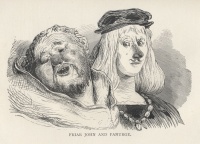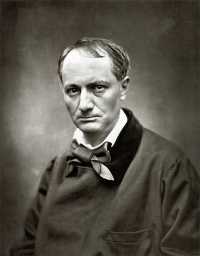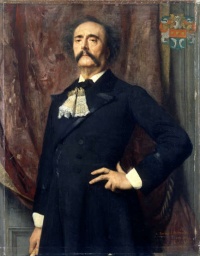French literature
From The Art and Popular Culture Encyclopedia
| Revision as of 08:20, 31 March 2019 Jahsonic (Talk | contribs) ← Previous diff |
Current revision Jahsonic (Talk | contribs) |
||
| Line 2: | Line 2: | ||
| {| class="toccolours" style="float: left; margin-left: 1em; margin-right: 2em; font-size: 85%; background:#c6dbf7; color:black; width:30em; max-width: 40%;" cellspacing="5" | {| class="toccolours" style="float: left; margin-left: 1em; margin-right: 2em; font-size: 85%; background:#c6dbf7; color:black; width:30em; max-width: 40%;" cellspacing="5" | ||
| | style="text-align: left;" | | | style="text-align: left;" | | ||
| - | Canon: [[Georges Bataille]], [[Charles Baudelaire]], [[Maurice Blanchot]], [[Céline]], [[Denis Diderot]], [[Alain Robbe-Grillet]], [[Michel Houellebecq]], [[Georges Perec]], [[Pauline Réage]], [[Marquis de Sade]] | + | Canon: [[Georges Bataille]], [[Charles Baudelaire]], [[Maurice Blanchot]], [[Céline]], [[Denis Diderot]], [[Alain Robbe-Grillet]], [[Michel Houellebecq]], [[Georges Perec]], [[Rabelais]], [[Marquis de Sade]], [[Villon]] |
| French literary criticism: [[Sainte-Beuve]], [[Charles Baudelaire]] | French literary criticism: [[Sainte-Beuve]], [[Charles Baudelaire]] | ||
| - | Subgenres: [[The "frenetic" school of the 1820s/1830s]], [[French pulp fiction]], [[libertine novel]], [[naturalism]], [[nouveau roman]], [[Oulipo (movement)]] | + | Subgenres: [[The "frenetic" school of the 1820s/1830s]], [[French pulp fiction]], [[libertine novel]], [[naturalism]], [[nouveau roman]], [[Oulipo]] |
| - | Publishing houses: [[Obelisk]], [[Olympia]], [[Eric Losfeld]], [[Série Noire]] | + | Publishing houses: [[Obelisk Press|Obelisk]], [[Olympia Press|Olympia]], [[Eric Losfeld]], [[Série Noire]] |
| - | <hr> | + | |
| - | "During the 20th century, France has been more permissive than other countries in terms of censorship, and many important foreign language novels were originally published in France while being banned in America: Joyce's ''Ulysses'' (published by Sylvia Beach in Paris, 1922), Vladimir Nabokov's ''Lolita'' and William S. Burroughs's ''Naked Lunch'' (both published by Olympia Press), and Henry Miller's ''Tropic of Cancer'' (published by Obelisk Press). Additionally, Paris has been the home-in-exile to two American literary movements: the [[lost generation]] and the [[beat generation]]." Sholem Stein, Apr 2006 | + | |
| - | In his 1913 essay [[The Serious Artist]], Pound discusses two types of art; The "cult of beauty" and the "cult of ugliness". He compares the former with medical cure and the latter with medical diagnosis, and goes on to write "Villon, Baudelaire, Corbière, Beardsley are diagnosis." - "beauty is difficult": Cantos LXXIV, LXXX | + | Titles: [[Clelia]], [[Princess of Cleves]], [[Le Sopha, conte moral]], [[Thérèse Philosophe]], [[Bijoux Indiscrets]], [[The 120 Days of Sodom]], [[La Religieuse]], [[Les Liaisons Dangereuses]], [[L'Histoire de Juliette]], [[Les Fleurs du mal]], [[Madame Bovary]], [[À rebours]], [[Dom Bougre]], [[The Crimes Of Love]], [[The Hunchback of Notre Dame]], [[Le Rouge et le Noir]], [[Gamiani]], [[Artificial Paradises]], [[Salammbô]], [[Le Spleen de Paris]], [[The Temptation of Saint Anthony]], [[Les Diaboliques]], [[La Bête Humaine]], [[The She Devils]], [[Torture Garden]], [[Hell (Barbusse novel)|Hell]], [[In Search of Lost Time]] |
| - | Titles: [[Princess of Cleves]], [[Le Sopha, conte moral]], [[Thérèse Philosophe]], [[Bijoux Indiscrets]], [[The 120 Days of Sodom]], [[La Religieuse]], [[Les Liaisons Dangereuses]], [[L'Histoire de Juliette]], [[Les Fleurs du mal]], [[Madame Bovary]], [[À rebours]], [[Dom Bougre]], [[The Crimes Of Love]], [[The Hunchback of Notre Dame]], [[Le Rouge et le Noir]], [[Gamiani]], [[Artificial Paradises]], [[Salammbô]], [[Le Spleen de Paris]], [[The Temptation of Saint Anthony]], [[Les Diaboliques]], [[La Bête Humaine]], [[The She Devils]], [[Torture Garden]], [[Hell]], [[In Search of Lost Time]] | + | Authors: [[Abbé Prévost]] - [[Guillaume Apollinaire]] - [[Georges Bataille]] - [[Sylvia Beach]] - [[Jean de Berg]] - [[Honoré de Balzac]] - [[Charles Baudelaire]] - [[Maurice Blanchot]] - [[André Breton]] - [[Jean-Pierre Brisset]] - [[Restif de la Bretonne ]] - [[Albert Camus]] - [[Céline]] - [[Robert Desnos]] - [[Régine Deforges]] - [[Denis Diderot]] - [[Alexandre Dumas]] - [[Paul Eluard]] - [[Gustave Flaubert]] - [[Serge Gainsbourg]] - [[Théophile Gautier]] - [[Alain Robbe-Grillet]] - [[Michel Houellebecq]] - [[Victor Hugo]] - [[Joris Karl Huysmans]] - [[Alfred Jarry]] - [[Pierre Klossowski]] - [[Lautréamont]] - [[Gaston Leroux]] - [[Pierre Louÿs]] - [[André Pieyre de Mandiargues]] - [[Guy de Maupassant]] - [[Octave Mirbeau]] - [[Nerciat]] - [[Georges Perec]] - [[Pauvert]] - [[Marcel Proust]] - [[Raymond Queneau]] - [[Rachilde]] - [[Raymond Radiguet]] - [[Pauline Réage]] - [[Raymond Roussel]] - [[Marquis de Sade]] - [[Georges Simenon]] - [[Paul Valéry]] - [[Jules Verne]] - [[Théophile de Viau ]] - [[Voltaire]] - [[Emile Zola]] |
| - | + | <hr> | |
| - | French Sadean tradition | + | "In the early 20th century, [[Guillaume Apollinaire]] radicalized the [[Charles Baudelaire|Baudelairian]] poetic exploration of [[modern life]] in evoking planes, the [[Eiffel Tower]] and [[urban]] [[wasteland]]s, and he brought poetry into contact with [[cubism]] through his "[[Calligrammes]]", a form of [[visual poetry]]."--[[Sholem Stein]] |
| - | '... the French tradition represented by Sade, Lautreamont, Bataille, and the authors of Story of O and The Image... suggests that "the obscene" is a primal notion of human consciousness, something much more profound than the backwash of a sick society's aversion to the body. Human sexuality is, quite apart from Christian repressions, a highly questionable phenomenon, and belongs, at least potentially, among the extreme rather than the ordinary experiences of humanity. Tamed as it may be, sexuality remains one of the demonic forces in human consciousness - pushing us at intervals close to taboo and dangerous desires, which range from the impulse to commit sudden arbitrary violence upon another person to the voluptuous yearning for the extinction of one's consciousness, for death itself." --Susan Sontag, ''[[The Pornographic Imagination]]'' (1967) | + | |
| - | + | ||
| - | For Americans in the 1920s and 1930s | + | |
| - | For Americans in the 1920s and 1930s (including the so-called "[[Lost Generation]]"), part of the fascination with France was also linked to freedom from Prohibition. For African-Americans in the twentieth century (such as James Baldwin), France was also more accepting of race and permitted greater freedom (in a similar way, jazz was embraced by the French faster than in some areas in America). A similar sense of freedom from political oppression or from intolerance (such as anti-homosexual discrimination) has drawn other authors and writers to France. --http://en.wikipedia.org/wiki/French_literature_of_the_20th_century [May 2006] | + | |
| - | + | ||
| - | The [[Beat Hotel]] was a small, run-down hotel | + | |
| - | The Beat Hotel was a small, run-down hotel at 9 Rue Git-le-Coeur in the Latin Quarter of Paris. It gained fame through the extended 'family' of beat writers and artists who stayed there from the late 1950s to the early 1960s in a ferment of creativity. | + | |
| - | Allen Ginsberg and Peter Orlovsky first stayed there in 1957 and were soon joined by William Burroughs and Gregory Corso. It was here that Burroughs completed the text of Naked Lunch and began his lifelong collaboration with Brion Gysin. It was also where Ian Sommerville became Burroughs' 'systems advisor' and lover. Gysin introduced Burroughs to the Cut-up technique and with Sommerville they experimented with a 'dream machine' and audio tape cut-ups. Ginsberg wrote his moving and mature poem Kaddish at the hotel and Corso wrote the Mushroom cloud shaped poem Bomb. --http://en.wikipedia.org/wiki/Beat_Hotel [Jan 2006] | + | |} |
| - | |}[[Image:Friar John and Panurge.jpg|thumb|right|200px|[[Friar John]] and [[Panurge]] give the ''[[Blason and contreblason du couillon]]'' by [[François Rabelais|Rabelais]]]] | + | [[Image:Carte du tendre.jpg|thumb|right|200px|The ''[[Map of Tendre]]'' featured in ''Clélie'']] |
| + | [[Image:Collection of 21 Simenon romans durs bought at Panoply books, Antwerp, May 2020.jpg|thumb|right|200px|Collection of 21 Dutch translations of [[The 'romans durs' by Simenon|'romans durs']] by [[Georges Simenon]], in the [[Zwarte Beertjes]] collection, cover designs by [[Dick Bruna]]. | ||
| + | <br><small>Photo © [[JWG]]</small>]] | ||
| + | [[Image:Friar John and Panurge.jpg|thumb|right|200px|[[Friar John]] and [[Panurge]] give the ''[[Blason and contreblason du couillon]]'' by [[François Rabelais|Rabelais]]]] | ||
| [[Image:Charles Baudelaire.jpg|thumb|right|200px|[[Charles Baudelaire]] (portrait by [[Etienne Carjat]], ca. [[1863]])]] | [[Image:Charles Baudelaire.jpg|thumb|right|200px|[[Charles Baudelaire]] (portrait by [[Etienne Carjat]], ca. [[1863]])]] | ||
| [[Image:Jules Amédée Barbey d’Aurevilly.jpg|thumb|right|200px|[[Jules Amédée Barbey d'Aurevilly]] (portrait by [[Émile Lévy]], ca. [[1882]])]] | [[Image:Jules Amédée Barbey d’Aurevilly.jpg|thumb|right|200px|[[Jules Amédée Barbey d'Aurevilly]] (portrait by [[Émile Lévy]], ca. [[1882]])]] | ||
| Line 100: | Line 94: | ||
| * [[Jean Genet]] - ''[[The Maids]]'', ''The Blacks'' | * [[Jean Genet]] - ''[[The Maids]]'', ''The Blacks'' | ||
| - | ===Non-fiction=== | + | ===Nonfiction=== |
| - | * [[Michel de Montaigne]] - ''[[Essays (Montaigne)|The Essays]]'' | + | * [[Michel de Montaigne]] – ''[[Essays (Montaigne)|The Essays]]'' |
| - | * [[Blaise Pascal]] - ''[[Pensées|Les Pensées]]'' | + | * [[Blaise Pascal]] – ''[[Pensées|Les Pensées]]'' |
| - | * [[François de La Rochefoucauld (writer)|François de La Rochefoucauld]] - ''The Maxims'' | + | * [[René Descartes]] – ''[[Meditations on First Philosophy]]'', ''[[Discourse on Method]]'' |
| - | * [[Jean-Jacques Rousseau]] - ''[[Discourse on the Arts and Sciences]]'', ''[[Social Contract (Rousseau)|The Social Contract]]'' | + | * [[François de La Rochefoucauld (writer)|François de La Rochefoucauld]] – ''The Maxims'' |
| - | * [[François-René de Chateaubriand]] - ''[[Génie du christianisme|Genius of Christianity]]'', ''[[Mémoires d'Outre-Tombe|Memoirs from Beyond Grave]]'' | + | *[[Jean de La Bruyère|Jean de la Bruyère]] - Les Caractères ou les Mœurs de ce siècle |
| - | * [[Alexis de Tocqueville]] - ''[[Democracy in America]]'' | + | *[[Louis de Rouvroy, duc de Saint-Simon]] - Mémoires |
| - | * [[Jules Michelet]] - ''Histoire de France'', ''La Sorcière'' | + | * [[Jean-Jacques Rousseau]] – ''[[Discourse on the Arts and Sciences]]'', ''[[Social Contract (Rousseau)|The Social Contract]]'', ''Les Confessions'' ([[Confessions (Rousseau)|Confessions]]) |
| - | * [[Albert Camus]] - ''[[The Myth of Sisyphus]]'' | + | * [[François-René de Chateaubriand]] – ''[[Génie du christianisme|Genius of Christianity]]'', ''[[Mémoires d'Outre-Tombe|Memoirs from Beyond Grave]]'' |
| - | * [[Jean-Paul Sartre]] - ''[[Existentialism is a Humanism]]'', ''[[Being and Nothingness]]'' | + | * [[Alexis de Tocqueville]] – ''[[Democracy in America]]'' |
| + | * [[Frédéric Bastiat]] – ''[[The Law (1850 book)|The Law]]'' | ||
| + | * [[Jules Michelet]] – ''Histoire de France'', ''La Sorcière'' | ||
| + | * [[Henri Bergson]] – ''[[Creative Evolution (book)|Creative Evolution]]'' | ||
| + | * [[Albert Camus]] – ''[[The Myth of Sisyphus]]'' | ||
| + | * [[Jean-Paul Sartre]] – ''[[Existentialism is a Humanism]]'', ''[[Being and Nothingness]]'' | ||
| + | * [[Simone de Beauvoir]] – ''[[The Second Sex]]'' | ||
| + | * [[Claude Lévi-Strauss]] – ''[[Tristes Tropiques]]'' | ||
| + | * [[Emil Cioran]] – ''A Short History of Decay'', ''The Trouble with Being Born'' and other works in French | ||
| + | * [[Paul Ricœur]] – ''Freedom and Nature. The Voluntary and the Involuntary'' | ||
| + | * [[Michel Foucault]] – ''[[Discipline and Punish]]'' | ||
| + | * [[Pierre Bourdieu]] – ''[[La Distinction]]'' | ||
| == Literary criticism == | == Literary criticism == | ||
| Line 125: | Line 130: | ||
| *[[Symbolism (arts)]] | *[[Symbolism (arts)]] | ||
| *[[Surrealism]] | *[[Surrealism]] | ||
| + | |||
| + | ===French decadents=== | ||
| + | :''[[décadentisme]]'' | ||
| + | |||
| + | * [[Jules Barbey d'Aurevilly]], ''[[Les Diaboliques (nouvelles)|Les Diaboliques]]'' (1874) | ||
| + | * [[Henri Beauclair]], [[Gabriel Vicaire]], ''[[Les Déliquescences d'Adoré Floupette, poète décadent]]'' (1885) | ||
| + | * [[Jean Bertheroy]], ''La Mime Bathylle'' (1894) | ||
| + | * [[Léon Bloy]], ''[[Histoires désobligeantes]]'', (1894) | ||
| + | * [[Élémir Bourges]], ''Le Crépuscule des dieux'' (1884) | ||
| + | * [[Louis Dumur]], ''Albert'' (1890) | ||
| + | * [[Georges Eekhoud]], ''Escal-Vigor'' (1899) | ||
| + | * [[Joris-Karl Huysmans]], ''[[À rebours]]'' (1884) | ||
| + | * [[Jules Laforgue]], ''[[Les Complaintes]]'' (1885) | ||
| + | * [[Jane de la Vaudère]], ''Les Sataniques'' (1897) | ||
| + | * [[Jean Lorrain]], ''[[Monsieur de Phocas]]'' (1901) | ||
| + | * [[Camille Mauclair]], ''[[Le Soleil des morts]]'' (1898) | ||
| + | * [[Octave Mirbeau]], ''[[Le Jardin des supplices]]'' (1899) | ||
| + | * [[Rachilde]], ''Les Hors Nature'' (1897) | ||
| + | * [[Maurice Rollinat]], ''Les Névroses'' (1883) | ||
| + | * [[Jean de Tinan]], ''[[Penses-tu réussir ?]]'' (1897) | ||
| + | * [[Auguste de Villiers de l'Isle-Adam]], ''[[Contes cruels (Auguste Villiers de l'Isle-Adam) |Contes cruels]]'' (1883) | ||
| == See also == | == See also == | ||
| Line 133: | Line 159: | ||
| * [[French science fiction]] | * [[French science fiction]] | ||
| * [[Fantastique]] | * [[Fantastique]] | ||
| - | *[[The Women of the French Salons ]] | + | * [[The Women of the French Salons ]] |
| - | *[[Cabinet de lecture: A History of French Reading Rooms]] | + | * [[Cabinet de lecture: A History of French Reading Rooms]] |
| - | *''[[Les Cent nouvelles nouvelles]]'' | + | * ''[[Les Cent nouvelles nouvelles]]'' |
| - | + | * [[French literature of the 20th century]] | |
| - | == We like == | + | * [[Roman populaire]] |
| - | [[Abbé Prévost]] - [[Guillaume Apollinaire]] - [[Georges Bataille]] - [[Sylvia Beach]] - [[Jean de Berg]] - [[Honoré de Balzac]] - [[Charles Baudelaire]] - [[Maurice Blanchot]] - [[André Breton]] - [[Jean-Pierre Brisset]] - [[Restif de la Bretonne ]] - [[Albert Camus]] - [[Céline]] - [[Robert Desnos]] - [[Régine Deforges]] - [[Denis Diderot]] - [[Alexandre Dumas]] - [[Paul Eluard]] - [[Gustave Flaubert]] - [[Serge Gainsbourg]] - [[Théophile Gautier]] - [[Alain Robbe-Grillet]] - [[Michel Houellebecq]] - [[Victor Hugo]] - [[Joris Karl Huysmans]] - [[Alfred Jarry]] - [[Pierre Klossowski]] - [[Lautréamont]] - [[Gaston Leroux]] - [[Pierre Louÿs]] - [[André Pieyre de Mandiargues]] - [[Guy de Maupassant]] - [[Octave Mirbeau]] - [[Nerciat]] - [[Georges Perec]] - [[Pauvert]] - [[Marcel Proust]] - [[Raymond Queneau]] - [[Rachilde]] - [[Raymond Radiguet]] - [[Pauline Réage]] - [[Raymond Roussel]] - [[Marquis de Sade]] - [[Georges Simenon]] - [[Paul Valéry]] - [[Jules Verne]] - [[Théophile de Viau ]] - [[Voltaire]] - [[Emile Zola]] | + | |
| - | ==See also== | + | |
| - | *[[French literature of the 20th century]] | + | |
| - | *[[Roman populaire]] | + | |
| {{GFDL}} | {{GFDL}} | ||
Current revision
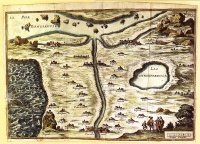
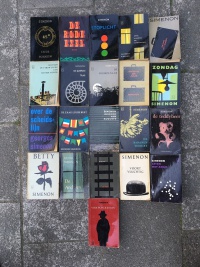
Photo © JWG
|
Related e |
|
Featured: |
French literature is, generally speaking, literature written in the French language, particularly by citizens of France. For literature written in French by citizens of other Francophone nations see Francophone literature.
During the 20th century, France was more permissive than other countries in terms of censorship, and many important foreign language novels were originally published in France while being banned in America: Joyce's Ulysses (published by Sylvia Beach in Paris, 1922), Vladimir Nabokov's Lolita and William S. Burroughs's Naked Lunch (both published by Olympia Press), and Henry Miller's Tropic of Cancer (published by Obelisk Press). Additionally, Paris has been the home-in-exile to two American literary movements: the lost generation and the beat generation.
Contents |
Selected list of French literary classics
Fiction
- Middle Ages
- anonymous - La Chanson de Roland (The Song of Roland)
- Chrétien de Troyes - Yvain ou le Chevalier au Lion (Yvain, the Knight of the Lion), Lancelot, ou le Chevalier à la charrette (Lancelot, the Knight of the Cart)
- various - Tristan et Iseult (Tristan and Iseult)
- anonymous - Lancelot-Graal (Lancelot-Grail), also known as the prose Lancelot or the Vulgate Cycle
- Guillaume de Lorris and Jean de Meung - Roman de la Rose ("Romance of the Rose")
- 16th century
- 17th century
- 18th century
- Voltaire - Candide
- Jean-Jacques Rousseau - Julie, ou la nouvelle Héloïse
- Denis Diderot - Jacques le fataliste (Jacques the Fatalist)
- 19th century
- Stendhal - Le Rouge et le Noir (The Red and the Black), La Chartreuse de Parme (The Charterhouse of Parma)
- Honoré de Balzac - La Comédie humaine ("The Human Comedy", a novel cycle which includes Père Goriot and Eugénie Grandet)
- Gustave Flaubert - Madame Bovary, Salammbô, L'Éducation sentimentale (Sentimental Education)
- Edmond and Jules de Goncourt - Germinie Lacerteux
- Guy de Maupassant - Bel Ami, La Parure (The Necklace), other short stories
- Émile Zola - Les Rougon-Macquart (a novel cycle which includes L'Assommoir, Nana and Germinal)
- Victor Hugo - Les Misérables (1862)
- Alexandre Dumas - The Count of Monte Cristo
- 20th century
- André Gide - Les Faux-monnayeurs (The Counterfeiters), The Immoralist
- Marcel Proust - À la recherche du temps perdu (In Search of Lost Time)
- André Breton - Nadja
- Louis-Ferdinand Céline - Voyage au bout de la nuit (Journey to the End of the Night)
- Colette - Gigi
- Jean Genet - Notre-Dame-des-Fleurs
- Albert Camus - L'Étranger (The Stranger)
- Michel Butor - La Modification
- Marguerite Yourcenar - Mémoires d'Hadrien
- Alain Robbe-Grillet - Dans le labyrinthe
- Georges Perec - La vie mode d'emploi
- Robert Pinget - Passacaille
Poetry
- François Villon - Les Testaments
- Pierre de Ronsard, Joachim du Bellay and other poets of "La Pléiade" - poems
- La Fontaine - The Fables
- Victor Hugo - Les Contemplations
- Alphonse de Lamartine - Méditations poétiques
- Charles Baudelaire - Les Fleurs du mal
- Paul Verlaine - Jadis et naguère
- Arthur Rimbaud - Une Saison en Enfer
- Stéphane Mallarmé - Un coup de dés jamais n'abolira le hasard ("A Throw of the Dice Will Never Abolish Chance")
- Guillaume Apollinaire - Alcools
- Francis Ponge
- Raymond Queneau
Theater
- Pierre Corneille - Le Cid, Horace
- Molière - Tartuffe, The Misanthrope, Dom Juan, L'Avare (The Miser), Le Bourgeois Gentilhomme, L'Ecole des femmes (The School for Wives)
- Jean Racine - Phèdre, Andromaque
- Marivaux - Jeu de l'amour et du hasard
- Beaumarchais - Le Barbier de Séville (The Barber of Seville), La Folle journée, ou Le Mariage de Figaro (The Marriage of Figaro)
- Edmond Rostand - Cyrano de Bergerac
- Jean Giraudoux - The Trojan War Will Not Take Place
- Jean Anouilh - Becket, Antigone
- Jean-Paul Sartre - No Exit
- Samuel Beckett - Waiting for Godot, Endgame
- Eugène Ionesco - The Bald Soprano, Rhinoceros
- Jean Genet - The Maids, The Blacks
Nonfiction
- Michel de Montaigne – The Essays
- Blaise Pascal – Les Pensées
- René Descartes – Meditations on First Philosophy, Discourse on Method
- François de La Rochefoucauld – The Maxims
- Jean de la Bruyère - Les Caractères ou les Mœurs de ce siècle
- Louis de Rouvroy, duc de Saint-Simon - Mémoires
- Jean-Jacques Rousseau – Discourse on the Arts and Sciences, The Social Contract, Les Confessions (Confessions)
- François-René de Chateaubriand – Genius of Christianity, Memoirs from Beyond Grave
- Alexis de Tocqueville – Democracy in America
- Frédéric Bastiat – The Law
- Jules Michelet – Histoire de France, La Sorcière
- Henri Bergson – Creative Evolution
- Albert Camus – The Myth of Sisyphus
- Jean-Paul Sartre – Existentialism is a Humanism, Being and Nothingness
- Simone de Beauvoir – The Second Sex
- Claude Lévi-Strauss – Tristes Tropiques
- Emil Cioran – A Short History of Decay, The Trouble with Being Born and other works in French
- Paul Ricœur – Freedom and Nature. The Voluntary and the Involuntary
- Michel Foucault – Discipline and Punish
- Pierre Bourdieu – La Distinction
Literary criticism
Poetry
- Main article: French poetry
French decadents
- Jules Barbey d'Aurevilly, Les Diaboliques (1874)
- Henri Beauclair, Gabriel Vicaire, Les Déliquescences d'Adoré Floupette, poète décadent (1885)
- Jean Bertheroy, La Mime Bathylle (1894)
- Léon Bloy, Histoires désobligeantes, (1894)
- Élémir Bourges, Le Crépuscule des dieux (1884)
- Louis Dumur, Albert (1890)
- Georges Eekhoud, Escal-Vigor (1899)
- Joris-Karl Huysmans, À rebours (1884)
- Jules Laforgue, Les Complaintes (1885)
- Jane de la Vaudère, Les Sataniques (1897)
- Jean Lorrain, Monsieur de Phocas (1901)
- Camille Mauclair, Le Soleil des morts (1898)
- Octave Mirbeau, Le Jardin des supplices (1899)
- Rachilde, Les Hors Nature (1897)
- Maurice Rollinat, Les Névroses (1883)
- Jean de Tinan, Penses-tu réussir ? (1897)
- Auguste de Villiers de l'Isle-Adam, Contes cruels (1883)
See also
- French culture
- French art
- List of French language authors
- List of French language poets
- French science fiction
- Fantastique
- The Women of the French Salons
- Cabinet de lecture: A History of French Reading Rooms
- Les Cent nouvelles nouvelles
- French literature of the 20th century
- Roman populaire

